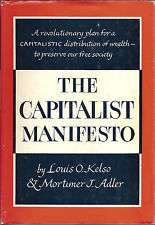The Capitalist Manifesto
 Cover of the first edition | |
| Editor | Louis O. Kelso, Mortimer J. Adler |
|---|---|
| Country | United States |
| Language | English |
| Published | 1958 |
| Media type | |
The Capitalist Manifesto is a best-selling book first published in 1958, written by Louis O. Kelso, a lawyer-economist and Employee Stock Ownership Plan (ESOP) inventor, and Mortimer J. Adler, an Aristotelian philosopher. The book was on the New York Times Non-Fiction Best Seller List in February and March of 1958, ranking 15th and 13th, respectively, and was reviewed in a number of major publications, including Time magazine, which stated that the book presents its analysis as "a revolutionary force in human affairs offering still unplumbed promise for the future," and that it "refutes the charge that capitalist thought has lost the imaginative flexibility to cope with the challenges of the age."[1]
In Chapter 5, the book details the three principles of economic justice, Participation, Distribution, and Limitation. These principles laid the foundation of what eventually came to be called “binary economics.” The term “binary” comes from attributing all production (participation) and just distribution of income to two factors, the human, classified as labor, and the non-human, classified as capital.
In the Preface, Adler acknowledged Kelso as the originator of the theory. The word “capitalism” in the title refers to a capital-intensive economy, i.e., one in which the bulk of production is carried out by capital. Some authorities believe that the term “capitalism” does not accurately describe the system Kelso devised, as they believe capitalism is a term invented by socialists to describe an economic arrangement of society where a relatively few private individuals own or control capital.
Publishing history
- New York: Random House, 1958.
- Westport, Connecticut: Greenwood Press, 1975.
- Whitefish, Montana: Literary Licensing, LLC, 2011.
- A version in .pdf is available free from the website of the Kelso Institute.
Notes
- ↑ Staff (February 10, 1958). "Capitalists, Arise!, Review of The Capitalist Manifesto by Louis O. Kelso and Mortimer J. Adler". Time magazine, p.106.